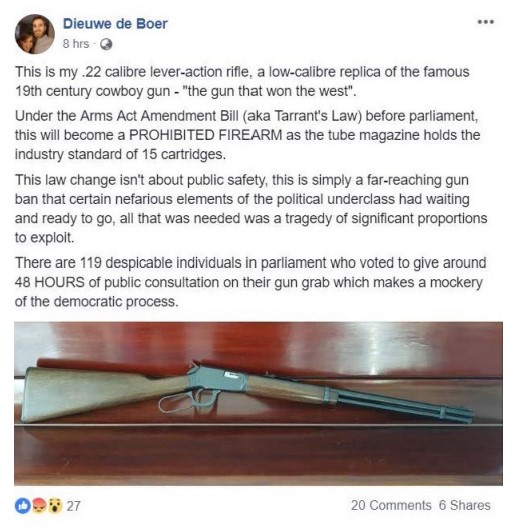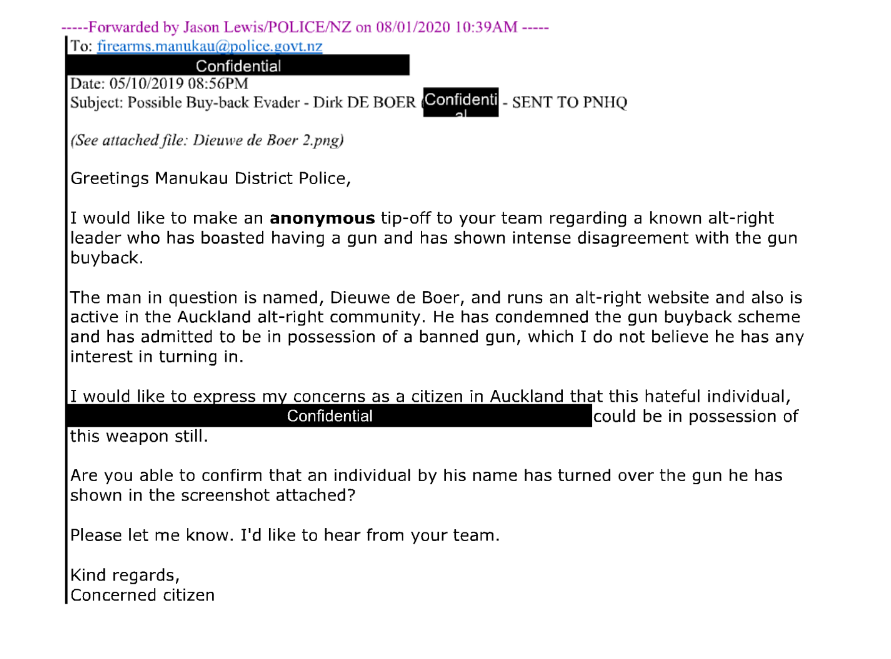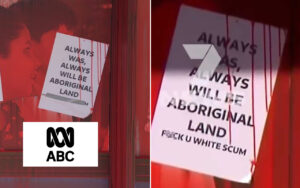A New Zealand father has won a five-year court battle after armed cops raided his home looking for a gun he no longer owned due to a politically motivated “anonymous” tip-off about an old Facebook post.
High Court Justice Christian Whata on Thursday found that the warrant used to search the suburban Auckland home of Dieuwe de Boer in January 2020 was invalid, and that the raid by armed officers breached his right to be free from unreasonable search.
Mr de Boer, a conservative commentator and radio host, was targeted by police over a nine-month-old Facebook post which questioned new firearms legislation and referred to a .22 calibre rifle he then owned, and he subsequently sued for trespass, breach of the New Zealand Bill of Rights Act 1990 (NZBORA) and abuse of process.
His claim failed in the District Court, but on appeal Justice Whata found that the process for obtaining the police warrant was flawed, and that Mr de Boer was “significantly prejudiced” by being portrayed as a “disgruntled” right-winger.


Mr de Boer said on Friday that the outcome was a victory for political free speech in New Zealand and the Bill of Rights, and the illegal raid was “entirely political”.
“It was kicked off by a far-left activist who was taken seriously by police. We have seen many more cases recently of police HQ employing online monitors to go and harass people for their political views,” he said.
“This is how police work hand-in-hand with these left-wing extremists and undermine their own credibility with the public. This needs to end.”
Mr de Boer shared a copy of the tip-off, which was anonymised by police on request of the informant, on social media after the judgement, describing it as politically motivated, defamatory and lacking important context.
Justice Whata found that the warrant application triggered by the tip-off failed to include a comment on the post by Mr de Boer inviting submissions on the firearms bill which added vital context to the post.
“The post was clearly a form of political speech designed to encourage participation in the democratic process. It was not simply a statement of disgruntlement as suggested by the police in the application,” he wrote in his judgement.
“I have come to the view that the omission of the comment linking the Select Committee process has caused significant prejudice to Mr de Boer. I am satisfied that a judicial officer, fully informed about the content of the post and the significance of the right of political free speech, probably would have either declined the application or sought further information about Mr de Boer’s background.
“The application for the warrant was not strong on its face. The information supporting an inference of possession of the rifle was several months old at the time of the application and there was no further information supplied by the police, other than his political and social ideology, to suggest that Mr de Boer presented a real risk of possessing a rifle unlawfully.
“He had no prior convictions for such behaviour and there was nothing in the posts produced that signalled by inference, or otherwise, an intention to retain the
rifle. In addition, there was nothing before the Judge to support an inference that Mr de Boer presented any sort of risk of wrongdoing whatsoever, other than his ‘right
wing’ posts.”

Justice Whata further found that the posts referred to did not support an inference that Mr de Boer was a threat to the community, and in fact promoted civility and compliance with the law.
However, he found that the search itself was conducted reasonably, and that there was no bad faith on behalf of the police, ruling there was an “unintentional omission rather than an intentional breach of the duty of candour”.
“I am mindful that the search involved an unlawful intrusion into Mr de Boer’s family home and of the harm that follows from this. But it was done for a proper purpose, that is to secure what the police believed to be an unlawfully possessed firearm,” he wrote.
He invited submissions on costs and said Mr de Boer should be compensated for reasonable costs in both court cases.
“We will be granted costs, but no damages. In the end we could not prove the police had acted maliciously and we were stonewalled very hard on discovery. The opinion of the court is that, if the police say they’re being honest, you have to believe them unless you can provide hard proof to the contrary,” Mr de Boer said in response.
Header image credit: Dieuwe de Boer





















